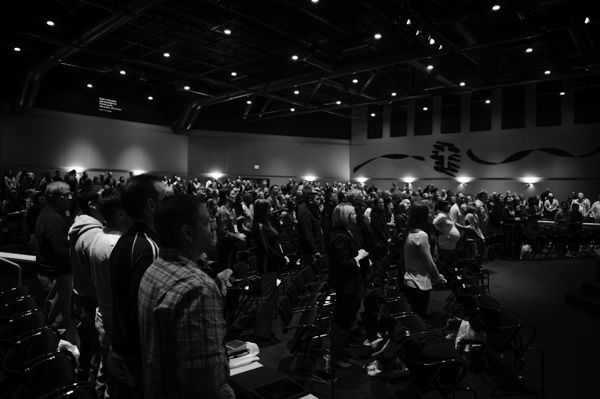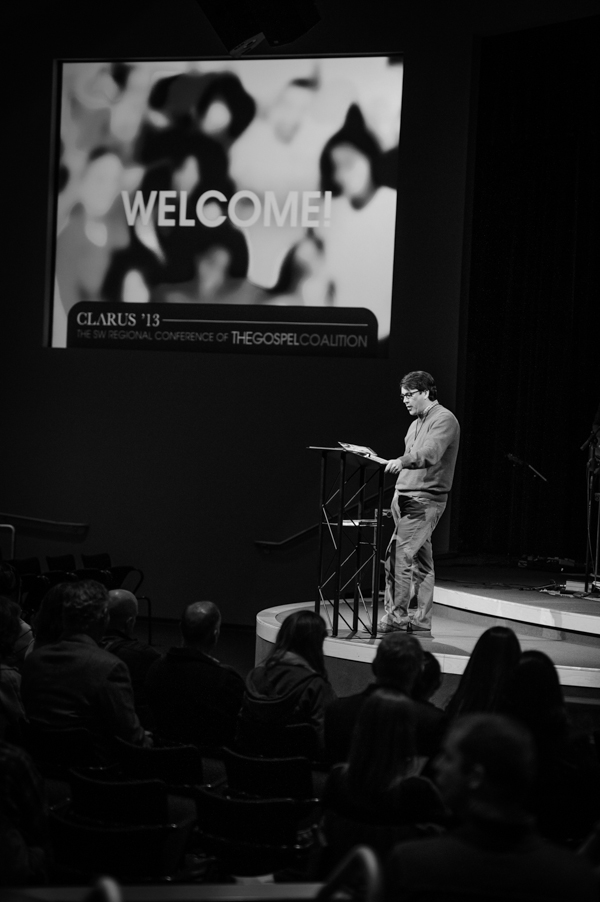Archive for March, 2013
Mar 9
Session 5 Recap: Lane, “Practicing Forgiveness: What to Do When You Failâ€
Editor’s Note: Tim Bradley is Pastor for Biblical Counseling and Family Ministry at Desert Springs Church in Albuquerque, NM. This post is a summary of Timothy Lane’s message from Saturday afternoon at Clarus, March 9, “Practicing Forgiveness: What to Do When You Fail,†from Matthew 18:21-35.
•••••
In Dr. Timothy Lane’s final message at Clarus 2013, he spoke about the importance of practicing forgiveness in our relationships. He stated that while it is critically important to the health of our relationships, and an essential part of our faith in Christ, it is one of the least practiced things we do. Dr. Lane states, “We think we do it, but we don’t.”
Dr. Lane opened his message by asking, “Is there any hope when we fail?” And then answering with an emphatic “Yes!” he said our hope in the midst of our failures in that we know and embody the grace that we have received in Christ. In other words, it is our knowing the grace and forgiveness of God, and then extending this same grace and forgiveness to others who have sinned against us. This practice of forgiving others, states Dr. Lane, is not something reserved for the extraordinary, unusual and infrequent moments of life only, but rather something that is to be practiced daily.
After introducing us to the subject of practicing forgiveness, Dr. Lane suggests nine important truths from the parable of the Unforgiving Servant (Matthew 18:21-35).
- What exactly is forgiveness? It is not just canceling the debt, but is absorbing the cost of the debt yourself. The Master in the parable absorbs the debt of the first servant. God absorbs our debt as Jesus suffers and dies for our sin, and we practice biblical forgiveness by canceling and absorbing the debt of another when they sin against us.
- Failure to forgive is when we make them pay. The first servant in the parable, who had been forgiven his debt by the Master, requires that the second servant pay the debt he owed. The first servant failed to forgive the second servant, and we fail to forgive when we make others pay for their sins against us rather than showing mercy.
- Forgiveness is an event and an ongoing process. Truly forgiving another is difficult, yet we must forgive as we’ve been forgiven, and keep on forgiving in our hearts, attitudes and actions.
- Failure to forgive turns victims into victimizers. This is clearly seen when the first servant, who was owed a debt by the second servant, fails to forgive, and then literally begins to choke him. We will become victimizers if we fail to forgive.
- Forgiveness is not peace at all costs. Here we back up in Matthew 18 to verse 15, and see that where sin persists, confrontation and discipline is right, God-honoring, and loving.
- Forgiving others is costly. It cost the Master much (ten thousand talents) to forgive the first servant, and it would have cost the first servant much (one hundred denarii) to forgive the second servant. It will cost us much to practice forgiveness.
- Forgiveness is first vertical, and then horizontal. Practicing forgiveness begins with our vertical relationship with God who forgives our sin. Practicing forgiveness continues when those who have been forgiven by God forgive another who has sinned against them.
- Forgiveness is not forgetting. The term “remembering” found in Jeremiah 31:34 is a covenant promise word, not a memory word. God is omniscient, so He doesn’t have any memory malfunctions. God promises to not treat us according to what our sins deserve, and in this sense He “remembers our sins no more.” We are to forgive like God has forgiven us, so we are to make a covenant promise to not treat another according to what they deserve, but we don’t always forget.
- The way we ask for and grant forgiveness is crucial. Simply saying, “I’m sorry” without asking for forgiveness when we have sinned against another diminishes our sin and the other person, and does not glorify God. Saying, “It’s ok” when another person has sinned against you and then apologized tells them it is ok for them to sin. When we sin against another, we need to acknowledge our sin, ask them for forgiveness, and repent. When we are sinned against, and forgiveness is sought, and repentance pursued, then we are to grant forgiveness – make the promises to not use it against them, not talk to others about their sin, and not dwell on it.
Dr. Lane concluded by asking the very practical and important question, “Why don’t we forgive?” He answers first by stating we don’t forgive because we really don’t think we need to be forgiven. We don’t truly know the forgiveness of God, nor believe we need it, and therefore we don’t forgive. Next he says we don’t forgive because we don’t think we’re forgivable. Either in pride, we can’t accept God’s forgiveness, or in shame we don’t remember and receive God’s forgiveness. We essentially forget the grace, love and forgiveness of God, so we fail to forgive others. Finally, Dr. Lane states that we don’t forgive because the utter amazement and shock of the gospel has waned within our hearts. Amazing Grace, is not so amazing to us…we have forgotten. He sums it up by saying, “If you’re not experiencing God’s monsoon of grace, then grace won’t flow out!”
May we be transformed by the amazing grace and forgiveness of God into those who practice the grace and forgiveness we have so richly received!
Mar 9
Session 4 Recap: Tripp, “The Essential Ministry of the Body of Christâ€
Editor’s Note: John Hunt is the Senior Pastor at Covenant of Grace Church in Albuquerque, NM. He is a member of the Albuquerque Chapter of The Gospel Coalition. This post is a summary of Paul Tripp’s message from Saturday morning at Clarus, March 9, “The Essential Ministry of the Body of Christ,†from Colossians 3:12-16.Â
•••••
“If your eyes ever see or ears ever hear the sin, weakness, and failure of the person next to you, it’s never an accident; it’s never an obstacle; and it’s never a hassle. Never, never, never … never. It is always an act God’s grace.â€
If you do see the failures of others in relationships as obstacles or hassles, it is because you fail to see relationships as God sees them. Why are you angry with that person whose sin you have just experienced? Is it because he broke God’s law? More likely, it was because he broke your law. God has put that person in your life—and you in theirs—as an act of grace and as agents of transformation.
From Colossians 3:12-14, Dr. Tripp drew out the truth that, “Your relationships do not belong to you. They are not to be shrunk down to your agenda.†Rather, because God owns that relationship, His agenda is all that matters. We are not merely recipients of His Kingdom, but we are instruments of His Kingdom. Therefore, “Put on Christ. Give others the same grace you have been given.†But you can only give this grace when you see your own deep need for grace. Our problem is not that we are too weak, but rather that we delusionally think we are too strong. We think that we can “fix†people. But we are not people-mechanics. We are ambassadors. For if we could fix people with threats or good advice, Jesus wouldn’t have needed to come and the cross would be unnecessary.
In Colossians 3:15-16, Paul offers some concrete applications for these profound truths. First, he says to let the peace of Christ rule your hearts. You do not need to look to creation for purpose, well-being, fulfillment, or any other need that you already have in Christ. The reason we often fail to live as ambassadors is because we look to other people to do for us that which only God is able to do. The peace of Christ means that Christ has met all my needs. Therefore, I do not need other people to meet my spiritual needs. When I am secure in this identity, I am now able to move outward and focus on others.
Second, let the Word of Christ dwell in you. The Word of Christ is the gospel. Study it; apply it; look through it as your lens for life. The gospel is not merely about forgiveness and going to heaven. Its focus is no just an entrance and an exit. The gospel is also about right now. This “now-ism†of the gospel is the present consideration of every part of life from the perspective of the gospel. “The gospel is the window of everything in life.â€
Third, the apostle commends us to teach and admonish one another. This focus is on every-member ministry. We teach others to see life through the gospel lens through which we are now seeing. We admonish by holding the mirror of the gospel up so that we can see what God wants all of us to see. In this way, all become instruments in the Redeemer’s hands. We live in a broken world of broken relationships, but only the gospel of grace brings healing and restoration. We must commit to one another, seeing our relationships as a means through which God is giving grace and ushering transformation.
Mar 9
Session 3 Recap: Lane, “Godly and Ungodly Conflictâ€
Editor’s Note: John Hunt is the Senior Pastor at Covenant of Grace Church in Albuquerque, NM. He is a member of the Albuquerque Chapter of The Gospel Coalition. This post is a summary of Timothy Lane’s message from Saturday morning at Clarus, March 9, “Godly and Ungodly Conflict,†from Jeremiah 17:5-10 and James 4:1-12.
•••••
Our relationships are in conflict all of the time. We know the biblical steps to reconciliation, but we seldom address conflict relative to the deeper issues of the heart. Dr. Lane showed us that the gospel of grace is the only godly response to conflict.
He first unpacked this by showing the spectrum that Christians tend to fall on in going about change. Moralists focus on behavior; Quietists focus on right thinking; but Covenantalists go beyond both behavior and right thinking. Christians are in covenant with God and can rely upon his promise of grace to help in all times.
Turning to James 4:1-12, Dr. Lane explained that you will encounter conflict. You can either respond in a godly or ungodly manner. James identifies the root of conflict to be internal desires rather than external circumstances (James 4:1-3). These desires (which may not be evil, in and of themselves) then increasingly progress into demands, needs, expectations, and disappointments. When we don’t get our desires met, we then punish others for not meeting our desires. Our unmet desires are the root of all conflict!
Do you then pray? Yes? No? Maybe? James points out that even when you pray, your prayers are too often rooted in selfishness. So we often wrongly pray for God to change the other person, while entirely ignoring ourselves.
Dr. Lane showed that this selfish and ungodly response must be deconstructed and then reconstructed. James directs our attention to the gospel of grace (James 4:4-10). By addressing his church negatively, James implies what they are and should be. In using the word “adulterousâ€, James is reminding them of their fundamental identity as the covenant bride of Christ. Even in the moment of sin, James reminds them that the Holy Spirit is jealously and zealously pursuing them. This is GRACE! And, incredibly, when we humble ourselves before him, he then pours out MORE grace.
The result of God’s grace is deep repentance. Now genuine change can begin to take place. Conflict is resolved, not by external behavior, but by internal transformation.
When I am confronted in conflict, the godly response then is to understand myself (James 1-3); understand the gospel with the accompanying intellectual faith and repentance (James 4-6); understand the other person (1 Peter 3:7-8); and then to seek to serve (1 Thessalonians 5:14). In all of this I must remember that Christ has justified me; therefore I have been received. Christ has sanctified me; therefore I need not sin. And because I belong to Christ’s kingdom, I don’t need to build my own kingdom (1 Corinthians 1:30).
In order for our horizontal relationships with others to be transformed and reoriented, our vertical relationship with God must first be transformed and reoriented — but only in that order.
Mar 9
Session 2 Recap: Tripp, “Self Examination Is a Community Projectâ€
Editor’s Note: Scott Pilgreen is a lay leader and biblical counselor at Desert Springs Church in Albuquerque, NM. This post is a summary of Paul Tripp’s message from Friday evening at Clarus, March 8, “Self Examination Is a Community Project,†from Hebrews 3:13.
•••••
What is happening in the little moments of your life? Dr. Tripp explained that we don’t live in the big moments of life but in the 10,000 little moments that shape our character. If God doesn’t rule us in the utterly mundane, He doesn’t rule us because the utterly mundane is where our address is.
To help us see the importance of relationships, Dr. Tripp taught from two passages. In 2 Peter 1:3-9, Peter is proposing that it is possible to be a true believer in Christ and yet be ineffective and unfruitful. Three questions naturally arise from this passage. First, Who are these people Peter is talking about? In a way, Peter is talking about all believers in Christ as being ineffective and unfruitful. Second, Why are these people ineffective and unproductive? In verse 9, Peter says: “…having forgotten that he was cleansed from his former sins,” and Dr. Tripp pointed out that the root of the issue is identity. If we forget who we are, we will quit pursuing what belongs to us in Christ. And third, How does this happen? Dr. Tripp suggests that we become can be ineffective and unproductive by evidence-denial – we deny our need for God’s grace in our lives. Evidence denial then leads to grace-devaluing. If the person doesn’t see the need for grace, grace has no value, therefore, that person becomes a grace-devaluer. Grace is only valuable to the person who knows that he or she is a sinner. In asking what all of this has to do with relationships, Dr. Tripp emphatically answered, “Everything.”
Dr. Tripp then led us to the second passage, Hebrews 3:12-13, which is both a warning and a call to believers in Jesus. The author of Hebrews is indicating a declining progression of an evil and then unbelieving heart that leads you to fall away from the living God. This is an alarming spiritual decline, but how does this happen? Dr. Tripp explained that it is because we are all extremely skilled, self-swindlers. We convince ourselves that our sin really isn’t that bad, and we harden our hearts. What once bothered us doesn’t bother us anymore. We aren’t open to change because we have become too satisfied where we are. The author of Hebrews then tells us we harden our hearts because of sin. Sin is deceitful. We become spiritually blind and we are blind to our blindness. Even though the power of sin has been broken, we can’t clearly see ourselves because the presence of sin still remains.
What then has God provided for the hard-hearted believer? He has provided help in the form of relationships. Hebrews 3:13a says, “But exhort one another every day.” We need to be encouraged and exhorted daily, so that we won’t be hardened by the deceitfulness of sin. Dr. Tripp explained that God has designed people as “instruments of seeing” for our lives. Every day we all are capable of being significantly blinded to our own condition, so we need “an intentionally intrusive, grace-based, Christ-centered, redemptive community†that is able to see in us what we cannot see in ourselves.
Dr. Tripp offered some great applications to these passages. The first is to honestly ask ourselves if there is a person in our life who can be that “instrument of seeing.” Can you name that person? The second is a prayer that we can all consider implementing into our daily prayer life: Confession – I am a person in desperate need of help; Pray – that in His grace He would send helpers our way; Cry for help – that we would have the humility to receive the help when it comes.
We can come to our Lord Jesus in our time of need because all of our rejection has been fully borne by Him on the cross. May it be so, that we run to our King Jesus for His glory and for our good.

















